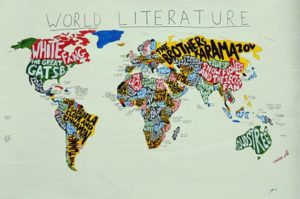INTRODUCING THE VALUE OF WORLD LITERATURE
World literature influences our stories. Everything you’ve read, wrote, or experienced is influenced by an older narrative. Some even express that every original story has already been written and we’re only recreating to what we’ve already read.
Personally, I’d argue that there is a difference between preexisting literature influencing narrative versus recreation. Preexisting literature influencing narratives causes original narratives like Game of Thrones to exist. We can see influences from past epics like Homer, in terms of an adventure narrative, or influences of these pieces of literature.
Meanwhile, recreation is redoing an existing story such as any story produced about Batman beyond the original series. Every story that re-imagines the fairy tale stories since the Brothers’ Grimm or the Hans Christian Anderson canon is a recreation.* Basically, we’re a bunch of fan-fiction writers re-imagining stories in new settings, genders, contexts … etc.
We have so many books that fall under world literature like classic literature or best-sellers. It can be historical or contemporary. What makes these books important is that they had an effect on our understanding of the world. Some of these books are culturally defining as well — nationally or internationally. These are the books we cannot dismiss as blips on the literary field like how we can dismiss many Harlequin books as blips.
Although I don’t recommend dismissing a full genre of books, Harlequin books as individual books aren’t as important to world literature as other narratives.** Of course, everything is relative and every genre or type of books is important. Some might say comics aren’t as important to culture as full-blown prose narratives. Yet, there are websites, academic fields, and expos dedicated to the genre. So bias is at play here.

Beyond being important to our understanding of the world and history, world literature helps ease our understanding of how contemporary narratives are developed. It also explains our literary lineage. For example, many Arab countries fight over Arabian Nights and to which country it belongs. The Greeks claim the Iliad and the Odyssey. The French praise themselves over Voltaire and Hugo. The English claim greatness through Shakespeare or Dickens. The Chinese express their aptitude with the Art of War. The Americans insist that Fitzgerald or Hemingway paved the way for new stories. Manga, a Japanese literary art form, brought the Japanese culture to the rest of the world. Whatever its lineage, World Literature has played a role in helping us understand ourselves as humans and find our commonalities.
The books I chose include (but are not limited to):
- The Epic of Gilgamesh (nd)
- A story from Arabian Nights (nd)
- Homer’s the Odyssey (nd)
- Voltaire’s Candide (1759)
- Some stories from Murasaki Shikibu’s the Tale of Genji (11th c)
- Salman Rushdie’s East, West (1994)
- Orhan Pamuk’s My name is Red (1998)
- Wole Soyinka’s Death and the King’s Horseman (1975)
- Jhumpa Lahiri’s Interpreter of Maladies (1999)
- Jorge Luis Borges’s Ficciones (1941)
- Art Spiegelman’s Maus (1991)
- George Orwell’s Why I Write (1946)
- Luís Vaz de Camões’s The Lusiads (1572)
If you want me to include a book from your repertoire, please indicate why you think the book is important in terms of world literature and pop culture. I would love to hear your opinion and would love to use your suggestions.
The point of this series is to connect the stories our teachers, professors, or whoever told us is a classic. Instead of reading it yourself, I’ll review it and give my honest opinion so you’ll know the worth of the book. I won’t just review it; I’ll relate it to our contemporaries and the stories we create that incorporate the past and bring it into the future with our new anxieties and fears!
Hope you enjoy this series and please tweet @roguesportal using #worldliterature with your suggestion and/or opinion!
Love and Peace.
*Fairy Tales are an oral folk tradition that change over time to match the contemporary era’s sensibilities until some men (mentioned) decided to write it down to create a canon. Of course, I am grateful that Anderson and Grimm wrote them down, which leads to us having this content today, but it did create an elitism in children’s stories. Some refer to those copies as world literature and the rest as recreation when it should be considered a part of a larger tradition in world literature.
**Side Note: I do not mean the publishers “Harlequin” but the romance genre ignited from the publishers’ works. Harlequin books are important because many women’s first interaction with the world of romance beyond Disney tend to be these romantic books. Personally, I read so many historical romances — some very historically inaccurate — and felt that it helped my teenage and young adult self. I needed that reassurance of love. It helped me also come to terms with the different types of love. It is also important to pop culture since some of the most successful stories have a level of romance that have harlequin origins.



![[REVIEW] Emma’s moral imperative exposed in Immoral X-Men #1](https://geekd-out.com/wp-content/uploads/2023/02/clean-5-150x150.jpg)
One thought on “[WORLD LITERATURE] THE VALUE OF WORLD LITERATURE”